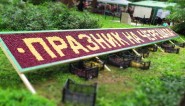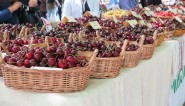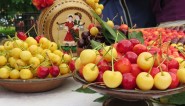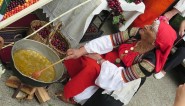Wine Festival – “Golden Grape” – February – Melnik
- Where: Melnik
- When: February
- Website: sandanski.bg
If wine is your drink, and you’re visiting Bulgaria in February, try to make your way down to Melnik. Even though it’s the smallest town in the country, Melnik boasts a rich heritage with plenty of natural and architectural landmarks.
Wine production and tourism are the main livelihoods of the locals. Practically every family cultivates its own grape vines to make wine for sale…and their own consumption. There are several high-profile wineries producing high-quality wine cherished all over the world. Commonly found varieties are Merlot, Cabernet Sauvignon, and the local Broad Melnik Vine.
The Golden Grape Festival is a two-day event that gathers the best winemakers of the region who compete to defend their product and pride. The celebrations are accompanied by the tunes of traditional Bulgarian music, with a rich and diverse program every year.
Mulled Rakia (Brandy) and Cabbage Soup Festival – February – Babovo
- Where: Babovo
- When: February
- Website: facebook.com/folklorenpraznik/
Bulgarian winter cuisine reserves a very special place for sour cabbage – that’s cabbage fermented in salty water. It’s served raw in salads, baked with pork or chicken, or cooked into the traditional “sarma” – minced meat and rice mix wrapped in cabbage leaves.
The juice from the fermented cabbage is a timeless Bulgarian recipe for curing hangovers. Had too much “rakia” (local distilled spirit)? Sour cabbage soup will bring back a smile to your face the morning after.
If mulled spirits and sour cabbage sound right to you, you should head towards the northeastern parts of Bulgaria, just a few kilometers away from the Danube River. In February, the village of Babovo hosts the Festival of Mulled Rakia and Cabbage Soup.
The cabbage soup is prepared in the huge “Champion’s Pot” and contains some 400 liters of water, 500 liters of sour cabbage juice, 120 kilos of chopped meat, onions, 25 kilos of noodles, 360 egg yolks, and a mix of local spices.
Apart from the surplus supply of mulled spirits and freshly-brewed cabbage soup, the festival celebrates Bulgarian traditions and culture. People from every corner of Bulgaria participate in competitions for the best traditional attire or cuisine, all of it under the tunes of customary folklore music and dances.
Bacon and Mulled Rakia (Brandy) Day – February – Apriltsi
- Where: Apriltsi
- When: February
- Website: apriltsi.org
Bacon is a highly regarded food in Bulgaria – a traditional appetizer on the dinner table and great company with homemade red wine or “rakia” in the winter months. Bacon in the Western world contains mainly meat with smaller amounts of fat from pork belly or back. In contrast, Bulgarian bacon is almost 100% fat with very little, if any meat. Traditionally, it’s prepared by curing with sea salt and can be eaten as is, but you’ll also find it smoked, grilled, fried, or even cooked in other dishes.
Every February, the Bulgarian town of Apriltsi celebrates traditional bacon and mulled brandy (“rakia”). You can browse a variety of stands by local meat and alcohol manufacturers, and enjoy a rich program of traditional music. The main attraction is “Grandma’s Special” – a meal prepared from 30 kilos of bacon, 500 eggs, 30 kilos of leek onion – all cooked in a huge pan on firewood in the middle of the plaza.
Banitsa Festival – May – Vratsa Region
- Where: Banitsa village, Vratsa region
- When: May
- Website: btvnovinite.bg
Banitsa is a staple pastry with a huge history in Bulgarian families. It is made with thin layers of dough, such as filo, filled with feta cheese, eggs, and yogurt. Meat and spinach or sweet versions are also common. Banitsa is often eaten for breakfast, but it can also be a heartwarming lunch or dinner.
The traditional Banitsa Festival is held during May in the village with the same name—Banitsa—in the Vratsa region, Northwest Bulgaria. As part of the Festival, there is a culinary competition for making banitsa. Traditionally, the culinary masterpieces are divided into three categories—savoury, sweet, and original banitsa. They are evaluated by a jury, usually chaired by popular Bulgarian chefs.
In addition to culinary festivities, the day is also a folklore holiday with concerts by famous folk singers.
Rotisserie Grill and Bagpipe Festival – May – Zlatograd
- Where: Zlatograd
- When: May
- Website: zlatograd.bg
Did you know that the sound of Bulgarian bagpipes and the voice of Valya Balkanska travel through space on the Golden Record aboard the Voyager 1 and 2 spacecraft?
This sample of Bulgarian folklore music is so mesmerizing and pure, it brings you to a halt, runs shivers down your spine and puts tears in your eyes. It comes from the Rhodope Mountain region that spans the southeastern parts of Bulgaria.
Digital records don’t do it enough justice, though. If you want to experience this cosmic vibration, come to Zlatograd, Bulgaria’s southernmost town, in May and take part in the Rotisserie Grill and Bagpipe Festival. It’s a four-day event celebrating Bulgarian folklore music, including the famous bagpipe competition. You’ll find a rich variety of traditional foods and open-fire barbecue.
The festival ends with the celebration of Saint George’s Day – one of the national holidays in the country, day of the Bulgarian army and all people named George, which is one of the most commonly found male names. It’s customary to celebrate with a lamb barbecue, which will be prepared on the day before.
Wine and Gourmet Festival – May – Plovdiv
- Where: Plovdiv
- When: May
- Website: facebook.com/wineandgourmetfestival/
Grape vine thrives successfully pretty much everywhere in Bulgaria, including unique indigenous grapes. Wine production is a huge sector in the country and in 1966 tiny Bulgaria was the sixth largest exporter in the world. Many people cultivate their own vineyards and homemade wine is a widespread tradition and a source of national pride.
If you’re a wine connoisseur, you’ll appreciate your stay in Bulgaria and especially the Wine and Gourmet Festival taking place in Plovdiv during May or June (dates change). The festival is a marathon of events that span the whole week and take place in different venues around the historic old town of Plovdiv.
You can taste a huge variety of Bulgarian wines from established wineries, take part in wine tasting workshops, attend lectures, and participate in the celebration activities over the weekend.
Day of The Flat Sausage – June – Gorna Oryahovitsa
- Where: Gorna Oryahovitsa
- When: June
- Website: g-oryahovica.org
The flat sausage is a staple on every Bulgarian dinner table. It’s a most excellent appetizer or “meze” for the evening glass of wine, or “rakia”. You’ll find it in practically every Bulgarian home. You can eat it sliced, in a sandwich, throw it on the grill or in various hot pots and other dishes. There’s no Bulgarian who hasn’t had flat sausage and bread for dinner at least a couple of times in their life.
Bulgarian flat sausage is made from minced pork or beef mixed with caraway, savory, pepper and salt, then filled in specially prepared pork intestines and cured for several weeks until dry.
Each region has its own different recipe and many people make their own. But they all agree that Gorna Oryahovitsa, a small town near Veliko Tarnovo in northern central Bulgaria, has some of the best flat sausages you can find.
Every year in June, thousands of people gather in Gorna Oryahovitsa to celebrate this traditional Bulgarian food and cultural heritage. Expect to see a variety of Bulgarian folklore performances with traditional music and dancing, along with all the flat sausage and beer you can send down your throat.
Fried Sprat Festival – June – Balchik
- Where: Balchik
- When: June
- Website: festivalnacacata.com
With a coastline over 350 kilometers long, spanning the entire eastern border of the country, the Black Sea is ingrained in Bulgarian lifestyle.
One of the best ways to relax on a hot summer evening is to find yourself a table with a view and treat yourself to a large serving of fried sprat and the coldest beer you can find. Sprat is overly abundant in the Black Sea and therefore cheap and served in pretty much every restaurant on the coastline and even further to the west.
Balchik, north of the “sea capital” Varna, holds the annual Sprat Festival – a two-day event dedicated to the small fish and its best friend, the ice-cold beer. Visit the town in June to celebrate this Bulgarian seaside tradition and enjoy an interesting program of modern music, dance and craft workshops, and unique games and competitions every year.
Fish Soup Festival – June – Veliko Tarnovo Region
- Where: Byala Cherkva, Veliko Tarnovo Region
- When: June
- Website: facebook.com/ribenachorba
Soups are comforting, full of flavor, and tied to tradition. In Bulgarian cuisine, soups have a prominent place, but one of the top spots is taken by fish soup.
Variations of fish soups can be cooked with saltwater fish from the Black Sea or freshwater fish from the numerous Bulgarian rivers. Other ingredients include carrots, potatoes, and spices.
The Fish Soup Festival happens in June, on the picturesque bank of the Rositsa River, at the town of Byala Cherkva, Veliko Tarnovo region in Central Bulgaria.
The program of the event includes cooking, eating and a cheerful commotion, along with a fishing competition. Visitors are treated to fish soup made from a local recipe.
There is also a culinary competition for the most delicious fish soup, fish dishes and thematically decorated desserts.
The festival consists not only of amazing food, but from musical and dance performances, and a bazaar with products from local producers and artisans.
The Cherry Holiday – June – Kyustendil
- Where: Kyustendil
- When: June
- Website: kyustendil.bg
Every June, the southwestern city of Kyustendil holds Bulgaria’s Cherry Holiday – a 3-day celebration of the country’s rich variety of cherry trees.
Dozens of farmers gather in the city square to display a huge assortment of cherry sorts and derived products like jams, syrups, pies, pastries, and other delicious treats.
Nearby, you’ll find an arrangement of stands where local artisans display their cherry-themed works – dolls, jewelry, sculptures, holy icons, and other artworks. Those who present their works in the best way and make an indelible impression are the winners at the event.
It’s a truly wonderful celebration of this delicious fruit, which grows in abundance in orchards all over the country. If you like cherries, there’s no better place to be than Kyustendil in June.
Blueberry Nights Festival – July – Lodge Ambaritsa
- Where: Lodge Ambaritsa (mountain cabin)
- When: July
- Website: facebook.com/HijaAmbarica
You can find a variety of berries, taking a stroll through the Bulgarian forests in the summer. Neither of them has the fine taste and juicy texture of the blueberry. But if you want to have a bite, you’ll need to pack up your bag and head to the mountains.
Bulgarian blueberries grow around 1,700 meters in altitude, making them hard to reach for most tourists. If you’re up for the hike, you can take part in the Blueberry Festival in July, near the lodge Ambaritsa in the Trojan Balkan region.
The lodge itself rests at 1,540 meters above sea level and is accessible through several mountain trails, the shortest one starting from the “Cherny Osam” village. A few hours of hiking through the Central Balkan National Reserve will take you to the lodge, and several hundred meters further, your goal will unfold before your eyes – blueberry shrubs everywhere you turn.
The Festival was organized through voluntary efforts up until 2016 in support of the lodge, which was undergoing renovations. Hundreds of campers travelled in July to set their tents under the starry sky and taste the ripe blueberries right from the ground.
In 2024, Blueberry Nights returned for more magical moments surrounded by some of the most beautiful mountains in the Balkans.
Melon Festival – July – Kavarna Region
- Where: Bulgarevo village, Kavarna region
- When: July
- Website: facebook.com/NarodenBuditelBulgarevo
The most delicious melons are grown in the area of the village of Bulgarevo, Kavarna Municipality. Nearly 400 decares are farmed in the land of the settlement.
To celebrate this achievement, the village has organised the Melon Festival every summer in July since 2008. The event brings together producers and lovers of the sweet fruit from all over the country.
A competition for the largest and sweetest melon is held in the square, and the winners receive special awards. The youngest and oldest farmers are also honored. Every year, farmers present delicious, juicy, large, sweet, aromatic melons of different varieties at the festival.
Traditionally, the holiday will be accompanied by a culinary exhibition “Melon Fantasies”, which will reveal the incredible taste qualities of the honey temptation. In addition to carving decorations and various desserts, guests will have the opportunity to see various dishes made with melon.
The festive program also includes local folklore groups’ performances, melon-tossing, and lots of fun games for children.
Plum Festival – September – Troyan
- Where: Troyan
- When: September
- Website: festivalnaslivata.com
Plum is a native tree in Bulgaria, commonly found in backyards, orchards, and gardens in all parts of the country. Plums are particularly prolific in the mountainous region of Troyan. Troyan is a cultural center in Bulgaria, whose heritage dates back to the Roman Empire, and an access point to some of the most beautiful natural reserves in the Balkan Mountain Range.
Come to Troyan in September to take part in the Bulgarian Plum Festival. The event spans several days and presents the best from local folklore with traditional music, dancing, and dozens of artisan stands where you can find handcrafted products – carpentry, pottery, sewing, jewelry, and a variety of arts.
Of course, the main attractions are the food and drink stands, where you’ll have a huge supply of fresh plums and a variety of plum jams, nectars, and a favorite among Bulgarians – Troyan Plum Rakia, a strong distilled alcohol from fermented plums.
Yogurt Festival – September – Rhodope Mountain
- Where: Momchilovtsi
- When: September
- Website: facebook.com/MomchilovtsiFest
Yogurt is ingrained in Bulgarian culture and cuisine. It’s a staple dairy product found in every refrigerator and produced in huge quantities both for the domestic market and export.
More than a hundred years ago, Russian scientist and Nobel prize winner Ilya Metchnikov studied the longevity and good health of the Bulgarian rural population and discovered it was linked to the consumption of locally-produced yoghurt and a particular bacteria called “Lactobacillus Bulgaricus”.
This bacteria is responsible for the curdling of the milk and transformation into yogurt. It’s harmless to ingest, but it helps balance the gut flora, strengthening the intestines and preventing harmful bacteria from settling in and causing chronic diseases.
More than a century later, the Bulgarian yogurt has no analogy in Western nutrition or medicine. The best it could do is stuff you with probiotics, vitamins, and supplements. However, it takes a single visit to the Bulgarian Rhodope Mountain region to realize how much healthier these local villagers are and how much energy and strength they have to show, even at old age.
Each September, Momchilovtsi Village, in the central Rhodope region, hosts the Momchilovtsi Fest. This three-day event celebrates Bulgarian yogurt, traditions, and culture. Visitors can taste yogurt and dairy products from a plethora of local and national manufacturers and enjoy a rich program of folklore music and dancing. There are several educational lectures and workshops, a photo contest, a variety of games and activities. The main event is the Miss Rhodope contest – a special event celebrating Bulgarian beauty.
Tomatoes & Peppers Festival – September – Plovdiv region
- Where: Kurtovo Konare
- When: September
- Website: chitalishtekkonare.com
Bulgaria is traditionally an agricultural country. Its fertile land, rich in nutrients, has given birth to some of Europe’s most delicious fruits and vegetables. Specifically, tomatoes and peppers have played a big role in the local cuisine, with consumption all around the year – fresh in the summer and canned in the winter.
Kurtovo Konare is a seemingly unimportant village in the southern part of the country, but in September, it pays tribute to this large sector of the Bulgarian economy and livelihood.
If you want to try what real vegetables taste like, head down to Kurtovo Konare in September. You’ll find many traditional Bulgarian foods like freshly-made “lyutenitsa” – a cooked sauce from tomatoes, peppers and spices. You can participate in a dozen different art, photography and cooking workshops, and listen to traditional folklore music.
Homemade Cheeses Festival – September – Lovech Region
- Where: Cherni Vit village, Lovech region
- When: September
- Website: facebook.com
The event features homemade cheeses from different regions of Bulgaria and the Balkans, including cheeses from small local dairies. The star of the forum is the local green cheese, which gives a different color, taste, and aroma depending on the stages of maturity.
The main goal is to present the wealth of cheeses in the Balkans, which are not so famous to the general public. The event is intended for people who want to get acquainted with the centuries-old tradition of making dairy products.
There are also demonstrations, presentations, tastings, and meetings with specialists from the cheese industry. The presentation of scientific research on traditional products and innovative approaches is especially valuable.
Through tastings and cheese-making demonstrations, visitors can learn about the production process and the differences between cheeses from different regions. These authentic flavors are combined with honey, bread, wine, and other delicacies from traditional Bulgarian cuisine to create a unique culinary atmosphere.
Elena Pork Ham Day – October – Veliko Tarnovo region
- Where: Elena
- When: October
- Website: visit.elena.bg
Elena pork ham is a delicacy produced from pork leg cured with salt in a traditional wooden barrel for a month and a half, then air dried. This meat resembles Italian “prosciutto crudo”, but it’s only produced in the mountain town of Elena, near Veliko Tarnovo, and has its own unique taste. It’s a very special treat for Bulgarians and usually reserved for the highest of occasions.
At the end of October, Elena hosts a special celebration day of its pork ham. You can enjoy a plethora of pork ham prepared by Elena’s best masters, take part in the pig roasting ritual, shop through a dozen crafts stands, and enjoy an amazing program of folklore music.
Pumpkin Festival – October – Sevlievo
- Where: Sevlievo
- When: October
- Website: facebook.com/StolicaNaTikvata
Halloween is not a traditional holiday in Bulgaria, but if you’re a master pumpkin carver, you can get an early practice session in Sevlievo – a town in the northern central part of the country, known as the Bulgarian Pumpkin Capital.
Early in October, Sevlievo hosts its traditional Pumpkin Capital Festival, bringing together pumpkin enthusiasts and farmers to celebrate the squash fruit and its place in the local culture and cuisine. The festivities include pumpkin carving, a plethora of delicacies and meals prepared from pumpkins, art displays, and open concerts in the central plaza.
The first day of the event coincides with the International Night in the Museums initiative, so visitors can tour the local museums and galleries free of charge in the evening. On the second day, more concerts and entertainment await, as well as the farmer’s market, where you can purchase local foods and delicacies from Bulgaria.
Smilyan Bean Festival – October – Smolyan Region
- Where: Smilyan, Smolyan region
- When: November
- Website: festivali.eu
Beans are a staple in Bulgarian cuisine, with bean stew being part of the menu in just about every home around the country. Bean cultivation is a significant industry in Bulgaria and the Smilyan village, in the southern parts of the country, is famous internationally for its high-grade salad bean production.
In November, the village hosts its annual Smilyan Bean Festival – a celebration of local agriculture and traditions. You can expect a big selection of bean stands on display, colorful artworks, and compositions using real beans. Numerous contests, games, and a comedy program will entertain visitors.
Of course, there will be plenty of bean meals to try and original recipes only found in Bulgaria, all of them served under the tunes of Bulgarian folklore music.
Rakia Fest – December – Sofia
- Where: Sofia
- When: December
- Website: balkanrakiafest.com
Rakia is the traditional distilled alcohol of the Balkans – the local alternative to brandy, tequila, sake, and other strong spirits around the world.
It’s made by distilling fermented fruit, the most common being grapes and plums. That said, you can make rakia from just about any fruit, so long as it has sugar content – peaches, apricots, apples, pears, figs, cherries, kiwis, and even roses. The variety is further increased by mixing in herbs, spices, and ageing the alcohol in wooden barrels of various origins.
Since many Bulgarians own either an orchard, a vineyard, or some form of agricultural land, rakia production remains a strong tradition and a source of national pride. Though industrial production occurs in large volumes, Bulgarians have special regard for homemade rakia, which is usually stronger, with 40% and 65% alcohol content, and richer in flavor.
The Rakia & Spirits Fest in the capital, Sofia, is a two-day event celebrating traditional Balkan alcohol. Visitors can taste a huge selection of over 400 different rakia spirits. Representatives from more than 30 distilleries in Bulgaria, Serbia, Greece, North Macedonia, Montenegro, Turkey, China, Brazil, and other countries gather to show their best products and celebrate their success.
It’s a truly wonderful event for appreciators of spirit alcohol and a great way to heat up the atmosphere in usually chilly December.







